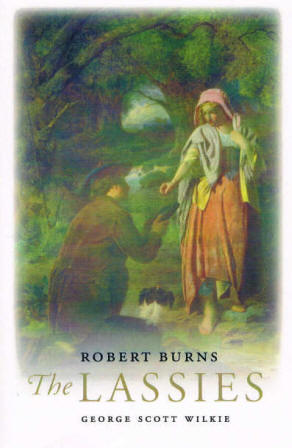|
Edited
by Frank R. Shaw, FSA Scot, Dawsonville, GA, USA
Email:
jurascot@earthlink.net
I have known of George Scott Wilkie since 2002
when he published Understanding Robert Burns, Verse,
Explanation, and Glossary. In fact, if one can say they know
someone by reading a book, then I know him quite well! He published The
Lassies in 2004, and for me it was like new found time with an old
literary friend. Wilkie will teach you verse by verse about Robert Burns if
you are willing to read the works of a man who “walks the walk” and “talks
the talk” on the subject of the Bard. He will not lead you astray concerning
Burns. In his introduction to Understanding Robert Burns, Wilkie
concludes with these words, “Read and enjoy the words of Robert Burns and
you will join the many millions who have fallen under his spell”. One cannot
ask for more than a’ that.
Some months ago while attending our monthly
gathering of the Burns Club of Atlanta, I was chatting with good friend and
fellow member Keith Dunn prior to the start of the meeting. Another member
walked by carrying a book that looked familiar to me and I mentioned to
Keith it looked like a volume written by George Scott Wilkie. After inquiry,
the owner revealed that it was indeed Wilkie’s Understanding Robert Burns.
It’s easy to spot a distinctive book one has spent so much time with!
Last year, out of the blue, I received an email
from George Wilkie with some words of encouragement about a situation that
will remain untold, but his words meant the world to me. “When ignorance is
on the march, stand aside and let it pass you by!” Thanks, George. I did
just that!
We are in for another treat from this author.
His new book, Robert Burns: A Life in Letters, is due
to be published on April 14. George describes it as a selection of letters
written by Burns, Clarinda, his brother William, and others. His publisher,
Neil Wilson, portrays it as “a comprehensive publication of the
correspondence of Robert Burns spanning 1780 to 1796 arranged
chronologically.”
One closing word on Wilkie. He “was exposed to
the work of Burns as a Leith schoolboy and has retained his interest in the
bard throughout his life. He is retired and lives near Cambridge.” (FRS:
3.23.11)
Burns and Sex
By George Scott Wilkie

Author George Scott Wilkie
It might seem that attempting to portray Robert
Burns as a man of high morals is defending the indefensible, but it is my
belief that he was just that.
He certainly fathered several children outside
of the marriage bed, but that was a far from unusual occurrence in the 18th
century. The main difference between then and today’s society is that Burns,
in common with the majority of his peers, either took the child into his own
family or ensured the mother was financially secure. No benefit agencies
existed to take responsibility for unmarried mothers and no council flats
were put at their disposal.
Burns was fifteen when he first felt the blood
racing in his veins as he and his partner in the harvesting pulled the
thorns and nettle stings from each other’s hands after a day’s toil in the
fields. Fourteen-year-old Nelly Kilpatrick was the lass who awakened his
feelings and was also the inspiration for one of the Bard’s early ventures
into verse. However, his admiration for young Nell was because of her gentle
demeanour and modesty and was confined to no more than words of admiration.

Young Robert soon became fascinated and
enthralled by the young lasses in his neighbourhood, and although he
appeared to fall in love with astonishing ease, still showed an incredible
maturity in realising that beauty was skin-deep and a fine intellect was
preferable to a pretty face.
The charms o’ the min’, the langer they shine
The mair admiration they draw, man;
While peaches and cherries, and roses and lilies,
They fade and they wither awa’, man.
Wise words indeed, but totally forgotten when he
became smitten by the beauty of a young woman he encountered on a random
walk and who was the subject of a beautiful poem he composed about her, The
Bonnie Lass o’ Ballochmyle.
He wrote a lengthy epistle to the young lady,
Wilhelmina Alexander, enclosing a copy of the poem, but she chose not to
reply to him although she still had his poem in her possession many years
after when she died.
However, it was not long before the young man
discovered that modesty was all very well, but that a proper sexual
relationship was infinitely preferable.
His young brother, William, had moved to London
and sought advice from Robert on how he should conduct himself now that he
had fallen in love. Robert’s answer tells us exactly what he considered the
right approach.
Your falling in love is indeed a phenomenon.
To a fellow of your turn it cannot be hurtful. I am, as you know, a veteran
in these campaigns, so let me advise you always to pay your particular
assiduities and try for intimacy as soon as you feel the first symptoms of
the passion: this is not only best, as making the most of the little
entertainment which the sport-abilities of distant addresses always gives,
but is the best preservative for one’s peace. I need caution you against
guilty amours, they are bad and ruinous everywhere, but in England they are
the very devil.
This was how Burns had conducted his many
affairs over the years. When he was seventeen his mother had a young servant
girl by the name of Elizabeth Paton helping her in the house and very soon
she became pregnant to the young Bard. Robert’s mother was keen that her son
should marry Elizabeth but his siblings protested that she was much too
rough and uneducated for their elder brother and her child was eventually
accepted into the household and brought up as a member of the family. Young
Robert loved his daughter and composed a beautiful poem that promised she
would be brought up and treated with the same love that a child born in
wedlock would receive.
However, his poem, The Fornicator, is a boastful
tale in which he mocks those who have to use the services of prostitutes and
how he much prefers to lie on the grass with a willing partner, but in a
letter to a fellow poet, J. Lapraik, he admits that his fondness for the
girls has sometimes cost him money.
There’s ae wee faut they whiles lay to me,
I like the lasses, - Gude forgie me!
For monie a plack they wheedle frae me
At dance or fair;
Maybe some ither thing they gie me
They weel can spare.
Young Robert was constantly in conflict with the
church over his attitude to sex, a conflict that frequently caused him to be
sat on a stool reserved for the chastisement of those accused of
houghmagandie, or sex outside of marriage. This was a common offence,
particularly in the countryside where the young girls were well aware of the
birds and the bees and who seldom wore any form of underwear beneath their
loose smocks. He wrote to a friend complaining of how he perceived this to
be an unjust persecution.
I long had a wishing eye to that inestimable
blessing, a wife. My mouth watered deliciously, to see a young fellow, after
a few idle commonplace stories from a gentleman in black, strip & go to bed
with a young girl & no one durst say black was his eye; while I, for just
doing the same thing, only wanting that ceremony, am made a Sunday’s
laughing-stock, and abused like a pickpocket.
His distrust of prostitutes is revealed again in
another letter of advice to young William before his stay in London.
Another caution; I give you great credit for
your sobriety with respect to that universal vice, Bad Women. It is an
impulse, the hardest to be restrained, but if once a man accustoms himself
to gratifications of that impulse, it is then nearly or altogether
impossible to restrain it. Whoring is a most ruinous expensive species of
dissipation; is spending a poor fellow’s money with which he ought clothe
and support himself nothing? Whoring has ninety-nine chances in a hundred to
bring on a man the most nauseous & excruciating diseases to which Human
nature is liable; are disease & impaired constitution trifling
considerations? All this is independent of the criminality of it.
However, when an Edinburgh prostitute named
Margaret Burns (no relation) was banished from the city he wrote in her
defence, and when she died he wrote a few verses in her memory.
The final verse
reads………..
Beneath this cold, green sod lies dead
That once bewitching dame
That fired Edina’s lustful sons,
And quenched their glowing flame.
One young woman in particular had long been a
favourite of young Robert. She was Jean Armour, a girl who had long since
caught the eye of the Bard and who also fell pregnant by him. Burns wanted
to do the honest thing by Jean and the pair went through a simple act of
signing a paper to declare themselves married. Jean’s parents had other
ideas for they had no wish to see their daughter wed to this poor ploughman
whose reputation was not that of a desirable partner for their only
daughter. They ripped the paper into shreds and banished young Jean to live
with an aunt well out of the reach of Burns.
Robert was furious with what he considered an
act of betrayal by Jean and promptly had himself declared as being a single
man again, a simple act in these bygone days.
He had decided that life in Scotland was always
going to be fraught with problems and made the decision to travel to the
West Indies, a favourite destination for young Scotsmen at that time. In
fact he had also resolved to take a young woman named Mary Campbell with
him. She was his Highland Mary and although his friends tried to warn him of
Mary’s colourful past Burns was deaf to their warnings and arranged to meet
with Mary to travel together to Jamaica. Two things then occurred that had a
huge effect on the life of the Bard.
His poems were proving to be very popular in
Edinburgh and his first edition was soon to be published. Then his beloved
Mary became ill and died. Whether she died in childbirth remains a mystery,
but Burns was heart-broken and abandoned his plans to emigrate.
The death of Mary Campbell had a lasting effect
on Burns and it was some six years after her death that he wrote Highland
Mary, a beautiful song that tells of his sadness, particularly in the
closing verse.
O, pale, pale now those rosy lips I aft hae
kissed sae fondly;
And closed for ay the sparkling glance that dwelt on me sae kindly;
And mould’ring now in silent dust the heart that lo’ed me dearly!
But still within my bosom’s core shall live my Highland Mary.
By 1788 Burns was acknowledged as Scotland’s
Bard and was the darling of Edinburgh’s society. It was then that he met
Nancy McLehose, a young woman whose husband had deserted her along with her
young children.
Nancy was unusual in these days in being a well
educated young lady and she was keen to meet this ploughman poet who had
taken the city by storm. She succeeded in her wish to meet Burns who was
immediately smitten by this buxom young woman. However, Nancy was far from
being the sort of girl who would melt in his arms. She was both devout and
chaste and it is unlikely that things would have progressed after the
initial meeting had Burns not injured a leg in a coaching accident and found
himself bored and alone in his room. With time on his hands he wrote a short
note to Nancy expressing his pleasure at having met her. Nancy replied
immediately and thus began the series of letters that was to become famous
as the Clarinda Correspondence. This was because Nancy was terrified that
her reputation would be ruined if she, a married woman, were to be
discovered writing to a man other than her husband. At her suggestion she
began to sign her letters as Clarinda, and Robert became Sylvander.
The letters flowed between them at a phenomenal
rate, sometimes two or three in a day, and Burns became totally infatuated
by his pen friend.
Eventually they held clandestine meetings at
Nancy’s house, but Burns was to find that his usual approach towards sex met
with no approval from Nancy.
He did his utmost to turn their platonic
relationship into a full-blooded sexual one but Nancy resisted his every
move, albeit judging by the following extract from a letter she wrote to
him, she was very close to giving into him on at least one occasion………..
Sylvander, the moment I waked this morning, I
received a summons from Conscience to appear at the Bar of Reason. While I
trembled before this sacred throne, I beheld a succession of figures pass
before me in awful brightness! Religion, clad in a robe of light, stalked
majestically along, her hair disheveled, and in her hand the Scriptures of
Truth held open at these words – ‘If you love me, keep my commandments.’
Reputation followed; her eyes darted indignation, while she waved a
beautiful wreath of laurel, intermixed with flowers, gathered by Modesty in
the Bower of Peace. Consideration held her bright mirror close to my eyes,
and made me start at my own image! Love alone appeared as counsel in my
behalf. She was adorned with a veil, borrowed from Friendship, which hid her
defects, and set off her beauties to advantage. She had no plea to offer but
that of being the sister of Friendship and the offspring of Charity. But
Reason refused to listen to her defence, because she brought no certificate
from the Temple of Hymen! While I trembled before her, Reason addressed me
in the following manner; --‘Return to my paths, which alone are peace; shut
your heart against this fascinating intrusion of the passions; take
Consideration for your guide, and you will soon arrive at the Temple of
Tranquillity.’
Sylvander, to drop my metaphor, I am neither
well nor happy today; my heart reproaches me for last night. If you wish
Clarinda to regain her peace, determine against everything but what the
strictest delicacy warrants.
Burns may have found his encounters with his
beloved Clarinda to be frustrating, but whereas Clarinda succeeded in
preserving her cherished honour, her maid was not so successful and became
pregnant by Burns as she visited the Bard’s lodgings on regular occasions,
sent by her mistress to deliver and collect the letters that passed between
them.
The damaged leg eventually returned to good
health and Burns left Edinburgh and returned to Ayrshire.
His first task was to seek out Jean Armour who
was living in poverty in Alloway. He took her under his roof and bought her
a mahogany bed, all of which might seem peculiar considering his
relationship with Nancy, but Nancy had actually tried to encourage him to
settle down and get married to somebody who would make him happy.
However, this reunion was far from being
romantic as Jean was on the verge of giving birth and Burns wrote a shameful
letter to a friend boasting how he had made love to Jean on some horse
litter at that stage.
Robert Burns never had the belief that his poems
and songs would earn him enough money to live on and always believed that
his destiny was to be a farmer.
Sadly for Burns, although he had been an expert
in the sowing of wild oats, commercial farming proved too much for him. His
body had suffered dreadfully as a youngster when he was the principal
labourer on his father’s farm in his early teens and years of malnourishment
brought their own problems until he was forced to abandon farming and
eventually move to lodgings in Dumfries while working as an exciseman. He
had enjoyed several years of marriage with Jean Armour and appears to have
foregone his lust of earlier years. Then he met Anna Park! Anna was a
barmaid at the Globe Inn in Dumfries and had a reputation as a young lady
who could be persuaded to serve her male customers with more than ale if
required. Burns became infatuated by young Anna and she in turn became
pregnant by Burns. Anna disappeared from the scene, apparently she had gone
to Leith, but Burns produced the new baby which he presented to his wife,
Jean Armour, a week before she was due to deliver her own child.
Jean accepted the new addition to her family
with the comment that ’Rab should have had twa wives’.

 |

